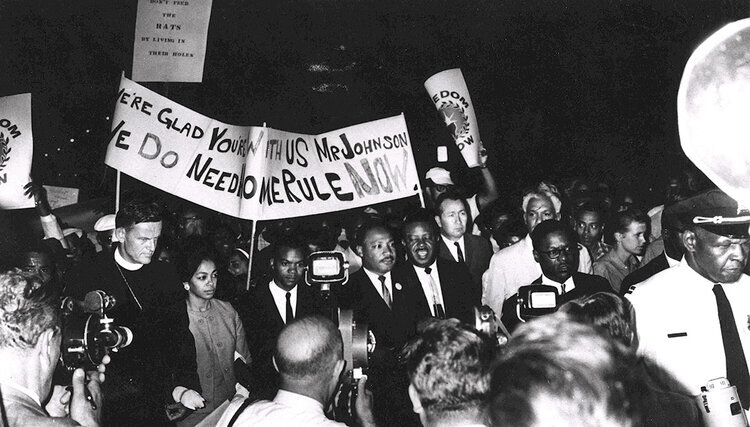
Civil Rights in Washington,
1950s – 1975
By the mid 20th century, power rests with the three commissioners, the D.C. Board of Trade, and segregationist southerners in Congress such as South Carolina Representative John McMillan.
McMillan heads the congressional committee overseeing the District, blocking all efforts at home rule. Meanwhile, by 1957, Washington, D.C. becomes the nation’s first urban area to be majority black. Cold War pressures lead to the passage and ratification of the 23rd Constitutional Amendment, resulting in D.C. citizens being able to vote for the nation’s president for the first time in 1964.
Local Civil Rights activists achieve significant change and voting rights: Julius Hobson, head of the D.C. Chapter of the Congress of Racial Equality, leads a coalition of black and white activists—Charles Cassell, Debby Hanrahan, and others-—in picket lines to secure jobs, housing, and reduced bus fares for blacks. Walter Fauntroy, pastor of the New Bethel Baptist Church, draws on the changing political dynamics in the South to establish a home rule movement in the District.
In 1965, Marion Barry opens a branch of the Student Non-Violent Coordinating Committee and initiates a “Free D.C.” movement and “Pride” for job training for black rights.
The Fight for Racial Equality, 1960s.
Segregation in Washington, DC, 1960s.
President Lyndon Johnson, responding to a swelling national Civil Rights Movement, replaces D.C.’s commissioner system with a nine-member district council and a single commissioner to serve as mayor. He appoints Walter Washington as the first African American to take on the role as the Capital’s mayor/commissioner.
In 1968, the aspirations for self-government are upended by Martin Luther King’s assassination and riots that destroy a part of the district. Local black leaders—Hobson, Fauntroy, Barry and Washington—must walk the streets to secure calm. Fauntroy’s campaign finally results in John McMillan’s defeat in South Carolina in the 1972 elections.
Freed temporarily from tyrannical Congressional control, Washington, D.C. holds its first election for mayor and local government in a century, with Walter Washington winning election as mayor. Activist Julius Hobson, architect Charles Cassell, journalist Sam Smith, and their coalition are not satisfied with home rule alone. They launch a D.C. Statehood Party to achieve full self-government.
When Hobson dies from cancer, Barry takes the lead for D.C. rights and wins election as D.C. mayor. For two decades, Barry dominates the political scene, promising he will “walk with kings” and “not lose the common touch.” He makes major inroads, offering blacks access to jobs and government contracts. In 1990, the federal government arrests Barry in an FBI drug sting; but even after a stint in jail, Barry remains a hero to his constituents and wins a fourth term as mayor in 1995. Undeterred, Congress reasserts its power by establishing a control board, and strips D.C.’s local government of many of its powers.
Washington D.C., 1940.


